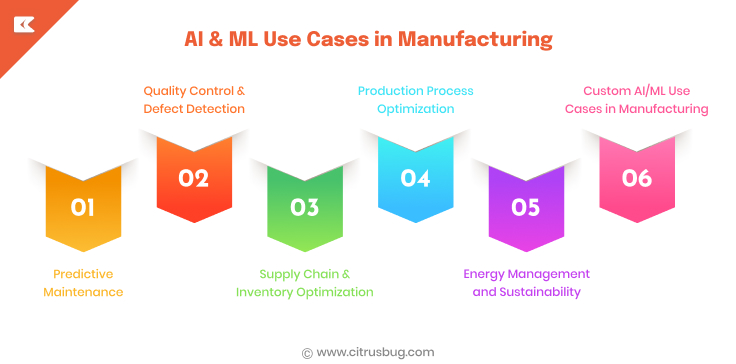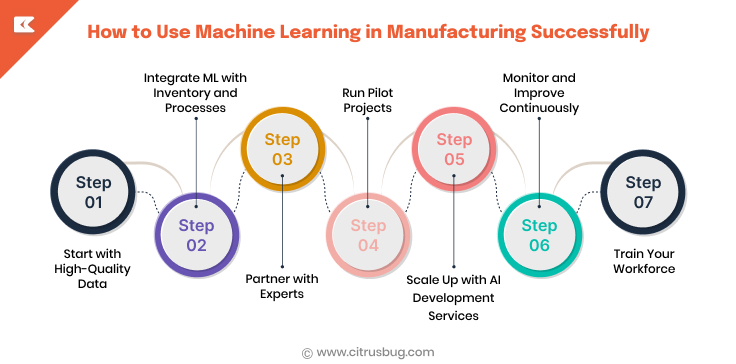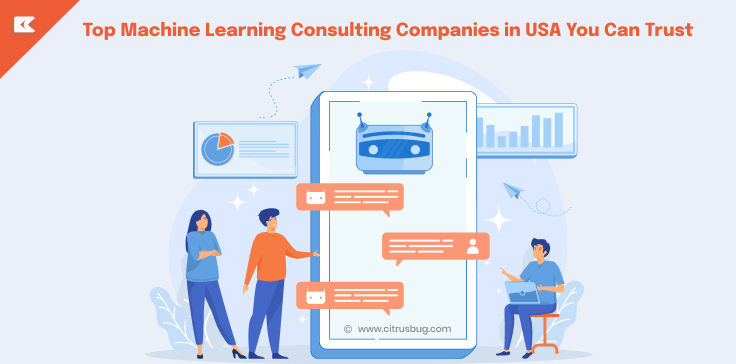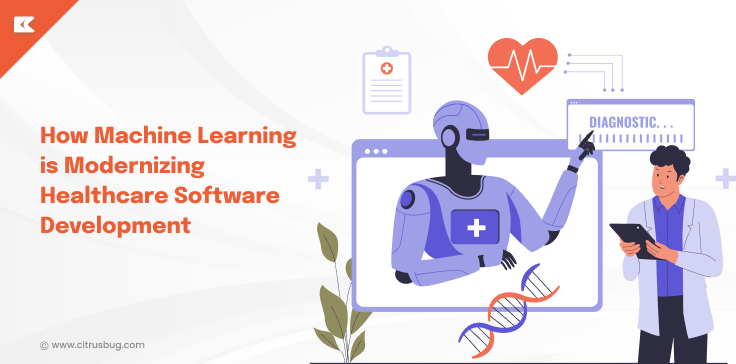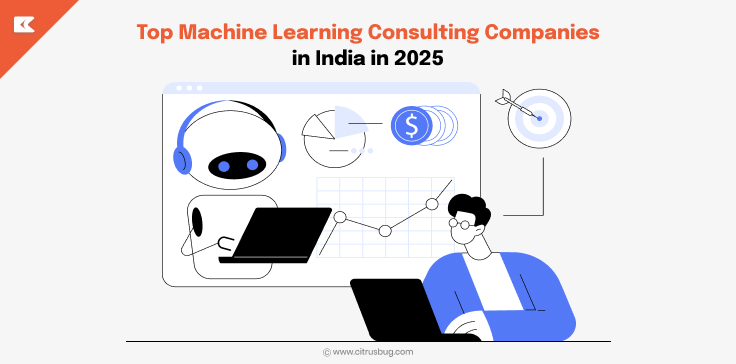Why Manufacturing Leaders Choose Custom Machine Learning Solutions?
- August 29, 2025
-
1029 Views
- by Ishan Vyas
Table of Contents
- What is Machine Learning in Manufacturing?
- Why Manufacturing Leaders Are Turning to Machine Learning
- How Can Machine Learning Be Used in Manufacturing?
- AI & ML Use Cases in Manufacturing
- Machine Learning in Manufacturing and Industry 4.0 Applications
- Machine Learning in Manufacturing Case Study
- How to Use Machine Learning in Manufacturing Successfully
- Future of Machine Learning in Manufacturing
- Why Choose Custom Machine Learning Solutions Over Generic Tools?
- Conclusion: Building the Future of Manufacturing
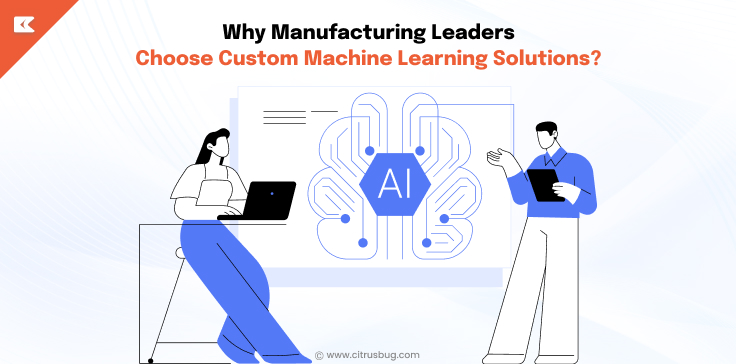
In today’s fast-paced world, factories not just run on machines, they run on data. Each sensor value, manufacturing record and quality assurance produces meaningful data. These insights can transform efficiency, maintenance of costs and general quality of output. This is where machine learning in manufacturing can come into play. Custom ML solutions help manufacturers eliminate downtimes, shape product consistency, and streamline the supply chain by learning the patterns and predicting outcomes.
Leaders are moving beyond generic software toward custom machine learning applications that adapt to their unique workflows and equipment. In this guide, we will examine why custom ML is important, the most effective AI and machine learning applications in manufacturing today, and real-world examples of how some organizations are already turning their factories into smarter factories through the use of data.
What is Machine Learning in Manufacturing?
Machine learning in manufacturing refers to the use of algorithms that analyze factory data such as sensor readings, equipment performance logs, and quality records to identify patterns, predict outcomes, and optimize processes. Instead of following rigid rules, these systems improve continuously by learning from new data, which makes production more adaptive and efficient.
AI in manufacturing is the broader concept where machines perform intelligent tasks, while machine learning is the specific branch that enables these systems to recognize patterns and make data-driven decisions. For example, AI may control a robotic arm, but machine learning allows it to detect product defects, anticipate machine failures, or adjust to changing production conditions.
The data and automation play a central role. The modern factories produce tremendous amounts of information on a daily basis. Using this information through machine learning helps the manufacturing companies to transition to predictive and adaptive processes. This results in less downtime, high quality, and real-time decision making that is not possible on conventional systems.
Why Manufacturing Leaders Are Turning to Machine Learning
The reason manufacturing leaders are embracing machine learning in manufacturing is that it can deliver quantifiable business impact. McKinsey reported that companies that use ML save close to half of their machine downtimes, boost labor productivity by 15-30%, and reduce quality-related expenses by up to 20%. Using AI algorithms that operate on actual production data, factories optimize procedures, predict breakdowns, and scale more intelligent decisions.
-
Cost Savings and Efficiency
Predictive maintenance is a process that allows plants to identify equipment problems before they result in expensive failures. Manufacturers save a lot of cost by minimizing unplanned downtimes as well as minimizing repair costs and optimizing the use of energy, and running a smoother and more reliable operation.
-
Better Quality and Decisions
Automated inspection of quality and intelligent inventory management boost accuracy and speed of production. By having access to real-time data, leaders reduce waste, increase consistency in their operations, and make informed decisions that are both optimal to the customer and long-term valuable.
-
Custom vs Generic Tools
The off-the-shelf solutions have limited flexibility since they are established to accommodate broad uses instead of special factory conditions. Custom machine learning in manufacturing is modified to suit specific processes, seamlessly integrates with other systems, and grows appropriately, providing more precision and a sustainable competitive advantage.
How Can Machine Learning Be Used in Manufacturing?
Machine learning in manufacturing is more than automation. It allows factories to make a shift from a reactive approach to proactive, data-based decision-making by analyzing data from production.
Some of the major uses of machine learning in manufacturing are predictive maintenance, automated quality inspection and demand forecasting. When supported by the right ML and AI development services, these systems become adaptable to the specific manufacturing requirements and facilitate the transition to Industry 4.0.
AI & ML Use Cases in Manufacturing
Machine learning in manufacturing is redefining the operations of the factories by making them more intelligent, efficient, and adaptive. Whether they involve predictive maintenance or energy optimization, such AI and machine learning in manufacturing applications are helping leaders reduce costs and waste and earn a competitive edge.
1. Predictive Maintenance
How Machine Learning Powers Predictive Maintenance
Machine learning algorithms examine sensor and equipment-log information to recognize patterns indicating potential equipment breakdowns. Instead of letting a machine break down or performing routine inspections, these models preempt problems, allowing repair before interrupting production.
Business Impact: Reduced Downtime and Extended Machine Life
Companies that have implemented predictive maintenance have recorded a reduction of 30% to 50% unplanned outages and a significant increase in the lifespan of the assets. These improvements reduce repair costs and optimize operational expenses, making repairs more intelligent and cost-effective.
2. Quality Control & Defect Detection
How Computer Vision Detects Defects in Real-Time
Machine learning provides continuous inspection of the products on the production line by use of computer vision systems. They are accurate to rectify all the defects that remain unseen by the human eye, so they maintain a good quality product.
Business Impact: Higher Product Quality and Lower Waste
Fewer defects in output reduce scrap levels, increase throughput and sustain stronger customer satisfaction. Automated quality checks can also contribute to the sustainability process by reducing wastage.
3. Supply Chain & Inventory Optimization
How ML Forecasts Demand and Inventory Needs
Machine learning algorithms check previous sales and production trends and external factors to project future demand accurately. This enables the manufacturers to plan better for production and inventory.
Business Impact: Optimized Logistics and Smarter Warehouse Management
Supply chains perform more efficiently when demand prediction is efficient. Warehouses hold the optimum of their stock, reducing their surpluses and understocks as well as increasing response to customer needs.
4. Production Process Optimization
How ML Identifies Bottlenecks and Inefficiencies
Machine learning analyzes manufacturing operations to identify areas of bottlenecks and unproductive assets. These insights can enable manufacturers to optimize their operations and enhance total efficiency.
Business Impact: More Intelligent Scheduling and Improved Resource Utilization
The optimized scheduling and resource allocation improve throughput, decrease idle time, and utilize the workforce and machinery optimally, which promotes productivity.
5. Energy Management and Sustainability
How ML Optimizes Energy Use in Factories
Machine learning understands energy use across equipment and operations to determine energy inefficiencies. Factories can alter usage patterns to diminish peak periods and minimize wastage.
Business Impact: Cost Reduction and Sustainability Compliance
Energy optimization reduces operational expenses and helps achieve environmental and sustainable objectives in support of corporate responsibility efforts while increasing profitability.
6. Custom AI/ML Use Cases in Manufacturing
How Tailored ML Models Address Unique Workflows
Each factory has unique processes, equipment, and operational challenges. Custom ML models created by proficient machine learning consulting companies can meet the specific needs.
Business Impact: Competitive Advantage Through Customization
Customized ML systems enhance precision, scalability and performance as compared to the generic platforms. Manufacturers can have a definite competitive advantage when it comes to preparing for the future of AI and machine learning in manufacturing.
Machine Learning in Manufacturing and Industry 4.0 Applications
Machine learning plays a central role in Industry 4.0, transforming traditional factories into smart, data-driven enterprises. The applications enhance efficiency, quality, and decision-making across all manufacturing phases.
Before vs After – The ML Transformation
| Traditional Manufacturing | ML-Enabled Industry 4.0 |
|---|---|
| Scheduled or reactive maintenance | Predictive maintenance with real-time sensor data |
| Manual inspection and random sampling | AI-powered computer vision for continuous defect detection |
| Periodic stock checks, manual planning | ML-driven demand forecasting and dynamic inventory optimization |
| Fixed production schedules | Dynamic scheduling based on ML insights |
| Uniform energy usage | Real-time energy optimization using ML models |
| Manual process adjustments | Workflow simulation and predictive modeling |
| Human-driven decision-making | Adaptive AI decision support for faster, accurate decisions |
Machine Learning in Manufacturing Case Study
BMW’s custom vision system shows the impact of machine learning in manufacturing. Using 1,200 high-resolution cameras and ML algorithms:
- Defects dropped by 30%
- Throughput increased by 20%
- Inspections ran alongside assembly, reducing delays
These results were possible because the ML models were trained on BMW’s own production data. Generic tools could not achieve the same accuracy or efficiency, demonstrating the value of custom ML solutions. Partnering with experienced machine learning consulting companies and leveraging AI software development services can help manufacturers achieve similar operational improvements.
How to Use Machine Learning in Manufacturing Successfully
Step 1: Start with High-Quality Data
Collect and organize accurate, labeled data from your factory. Historical equipment logs, quality inspection images, and energy consumption records form the backbone of any machine learning in manufacturing project. Leveraging insights from machine learning states, data and trends can help identify patterns and opportunities for optimization.
Step 2: Integrate ML with Inventory and Processes
Integrate your ML models into machine learning in inventory management and production processes. Supply chain, ERP, and IoT sensor data should be seamlessly included in your models to deliver insight and enhance effectiveness.
Step 3: Partner with Experts
Partner up with a team of AI software development agency that can leverage your operational expertise of the factory to develop customized ML solutions to meet your unparalleled production requirements.
Step 4: Run Pilot Projects
Start small with pilots on one production line or process. Monitor key performance indicators like downtimes, defect rates, or energy consumption to confirm that you have an effective ML solution and then apply it on a large scale.
Step 5: Scale Up with AI Development Services
Once validated, expand the ML implementation across multiple lines or facilities. Integrate models with plant IT systems, IoT controllers, operator dashboards, and real-time monitoring tools to maximize impact.
Step 6: Monitor and Improve Continuously
ML models must evolve. Monitor their performance, retrain with new data, and watch for concept drift to ensure they remain accurate and effective over time.
Step 7: Train Your Workforce
Upskill operators so they become active collaborators with ML systems rather than passive users. A workforce trained in AI and ML ensures sustainable success and prepares your factory for the future of AI and machine learning in manufacturing.
Future of Machine Learning in Manufacturing
Smarter and autonomous systems
Manufacturing systems are already becoming smarter to learn and get better. This transition is opening a path to high efficiency and less manual control of autonomous operations.
Generative AI for design and workflows
According to IDC, the adoption of generative AI has surged from 55% in 2023 to 75% in 2024, with a promising return of 3.7 dollars per 1 dollar invested. It is changing how manufacturers design the parts and plan production processes.
Self-optimizing production with reinforcement learning
Production systems can adjust along the way with reinforcement learning. They regulate workflow in real-time and aid in reducing waste, maximizing throughput and ensuring achieved quality.
Real-time shop floor intelligence with Edge AI
Edge AI handles data on the machines rather than awaiting information to be processed on the cloud. This allows rapid reaction to any damage, equipment malfunctions, or power surges, so operations remain swift and well-organized. To make the most of such systems, many factories are also investing in manufacturing app development that connects operators with real-time data on mobile devices.
Industry 5.0: Human and machine collaboration
The next movement is Industry 5.0, which focuses on a human working with smart devices. The role of cobots and AI is to assist the workers, establishing a balance between highly automated solutions and human imagination.
Why Choose Custom Machine Learning Solutions Over Generic Tools?
When it comes to machine learning in manufacturing, one size rarely fits all. Custom ML-based solutions can provide the accuracy and flexibility that generic solutions struggle to deliver.
| Factor | Custom ML Solutions | Generic Tools |
|---|---|---|
| Tailored Fit | Aligned with your unique workflows, data, and industry challenges. | Built for general use, often ignores domain-specific needs. |
| ROI | Delivers faster improvements in downtime reduction and quality control. | Slower results, often requires costly customization. |
| Scalability | Flexible to expand with IoT systems, ERP, and future AI growth. | Limited adaptability, struggles with large-scale data. |
| Integration | Seamlessly connects with ERP, MES, and legacy manufacturing systems. | Integration gaps cause delays and extra costs. |
| Competitive Edge | Provides unique insights and smarter decision-making for Industry 4.0. | Competitors using the same tool gain similar results. |
Conclusion: Building the Future of Manufacturing
The application of machine learning is transforming production in many ways. It is no longer an experiment but a proven driver of value in terms of reduced downtime, improved product quality, and more efficient operations. Companies that go beyond generic tools and implement customized ML solutions are achieving faster results, better ROI, and are gaining a competitive advantage in an increasingly digital-first industry.
For manufacturers exploring this shift, the right partner makes all the difference. Teams with experience in manufacturing software development services can bridge the gap between factory knowledge and advanced algorithms. That’s where Citrusbug helps, designing solutions that fit seamlessly with existing systems while staying scalable for the future. The factories that act today are laying the foundation for smarter, more sustainable growth tomorrow.





 SaaS Development
SaaS Development Web Application Development
Web Application Development Mobile Application Development
Mobile Application Development Custom Software Development
Custom Software Development Cloud Development
Cloud Development DevOps Development
DevOps Development MVP Development
MVP Development Digital Product Development
Digital Product Development Hire Chatbot Developers
Hire Chatbot Developers Hire Python Developers
Hire Python Developers Hire Django Developers
Hire Django Developers Hire ReactJS Developers
Hire ReactJS Developers Hire AngularJS Developers
Hire AngularJS Developers Hire VueJS Developers
Hire VueJS Developers Hire Full Stack Developers
Hire Full Stack Developers Hire Back End Developers
Hire Back End Developers Hire Front End Developers
Hire Front End Developers AI Healthcare Software Development & Consulting
AI Healthcare Software Development & Consulting Healthcare App Development
Healthcare App Development EHR Software Development
EHR Software Development Healthcare AI Chatbot Development
Healthcare AI Chatbot Development Telemedicine App Development Company
Telemedicine App Development Company Medical Billing Software Development
Medical Billing Software Development Fitness App Development
Fitness App Development RPM Software Development
RPM Software Development Medicine Delivery App Development
Medicine Delivery App Development Medical Device Software Development
Medical Device Software Development Patient Engagement Software Solutions
Patient Engagement Software Solutions Mental Health App Development
Mental Health App Development Healthcare IT Consulting
Healthcare IT Consulting Healthcare CRM Software Development
Healthcare CRM Software Development Healthcare IT Managed Services
Healthcare IT Managed Services Healthcare Software Testing services
Healthcare Software Testing services Medical Practice Management Software
Medical Practice Management Software Outsourcing Healthcare IT Services
Outsourcing Healthcare IT Services IoT Solutions for Healthcare
IoT Solutions for Healthcare Medical Image Analysis Software Development Services
Medical Image Analysis Software Development Services Lending Software Development Services
Lending Software Development Services Payment Gateway Software Development
Payment Gateway Software Development Accounting Software Development
Accounting Software Development AI-Driven Banking App Development
AI-Driven Banking App Development Insurance Software Development
Insurance Software Development Finance Software Development
Finance Software Development Loan Management Software Development
Loan Management Software Development Decentralized Finance Development Services
Decentralized Finance Development Services eWallet App Development
eWallet App Development Payment App Development
Payment App Development Money Transfer App Development
Money Transfer App Development Mortgage Software Development
Mortgage Software Development Insurance Fraud Detection Software Development
Insurance Fraud Detection Software Development Wealth Management Software Development
Wealth Management Software Development Cryptocurrency Exchange Platform Development
Cryptocurrency Exchange Platform Development Neobank App Development
Neobank App Development Stock Trading App Development
Stock Trading App Development AML software Development
AML software Development Web3 Wallet Development
Web3 Wallet Development Robo-Advisor App Development
Robo-Advisor App Development Supply Chain Management Software Development
Supply Chain Management Software Development Fleet Management Software Development
Fleet Management Software Development Warehouse Management Software Development
Warehouse Management Software Development LMS Development
LMS Development Education App Development
Education App Development Inventory Management Software Development
Inventory Management Software Development Property Management Software Development
Property Management Software Development Real Estate CRM Software Development
Real Estate CRM Software Development Real Estate Document Management Software
Real Estate Document Management Software Construction App Development
Construction App Development Construction ERP Software Development
Construction ERP Software Development





